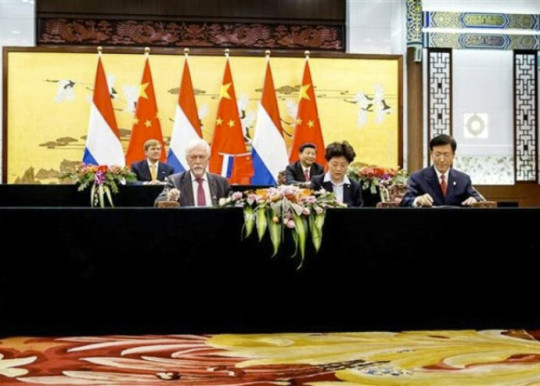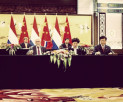Yantai lectures may be postponed till 2018
Update – Tuesday, 27 October at 11:57
The plan had been for a preparatory year, led by the China Agricultural University (CAU), for Chinese students to begin in 2016 and the RUG to follow suit in 2017. However, it appears that those plans may be pushed one year further down the road. Starting the preparatory year in 2017 also means that 2018 would be the first year for RUG-taught classes in China. The Chinese education system has a four-year bachelor system as opposed to the Dutch three-year system.
University board of directors member Jan de Jeu says that in the agreement which was signed in Beijing, the option to postpone the plans has been accounted for, although a decision to postpone the plans has not yet been made. ‘There is talk of starting in 2016 unless there are practical problems whereby it needs to be pushed a year further.’
Steps such as approval by the province of Shandong and the Chinese ministry of education still have to be taken, as well as changes to Dutch higher education law, which currently requires students at branch campuses to spend at least part of the degree studying in the Netherlands.
Critical aspects
‘Those are all critical aspects that make it such that you have to make that choice, and we are gradually approaching such a point that we would have to make that decision, but it has not yet been decided’, De Jeu says. ‘If it’s not feasible to begin for practical reasons in 2016, then it’s also okay to push it one year further out.’
In a report from the Yantai Advisory Committee from FEB that was published in late September, the committee members pointed out that the proposed ministry of education changes about requiring Chinese students to come to the Netherlands would not come into effect until 2016 at the earliest. The Chinese government was unwilling to require Chinese students to spend 25 per cent of their degree time in the Netherlands.
The reports of the potential delay follow after a press release from the RUG published on Monday night, stating that RUG president Sibrand Poppema signed a tripartite agreement earlier that day in Beijing with representatives from China Agricultural University and the city of Yantai about the financing of the research facilities at the branch campus.
Original story – Tuesday, 27 October at 11:00
King Willem Alexander
The agreement is meant to lay the financial groundwork for the branch campus plans in Yantai. ‘The city of Yantai will account for the costs for the construction and establishment of the research facilities on the campus and for any shortcomings in the budgets during the first three year’, the press release reads. The statement did not include an exact figure for the financial contribution of the city, however.
President Poppema and representatives from CAU and Yantai signed the agreement in the presence of King Willem Alexander of the Netherlands and Chinese president Xi Jinping during a state visit by the Dutch monarch.

Poppema is reportedly pleased with the agreement and also emphasises the assent that has been given from the Dutch and Chinese ministries of education for the budget. With this agreement, Poppema says, ‘The necessary research facilities can be realised, research-driven education can be offered and top research can be launched.’ The agreement also sets the branch campus up to further pursue its goals of ‘entrepreneurship and sustainability’ on campus.
Multinational companies
The press release also reiterated the promised financial support from several multinational companies in the development of the Yantai branch campus. In August, president Poppema informed the University Council that a 65 million euro gap existed in the budget, specifying at the time that Yantai would provide for 40 million euros of that budget.
The RUG president’s plan was to come up with the remaining 25 million euros himself from various industries and businesses, but Poppema also insisted to the university council that while the businesses who invest in the branch campus ‘can expect’ that research will be done in their field as a result of the financial contribution, participating businesses would not have any influence on the curriculum taught at the Chinese sister campus.






